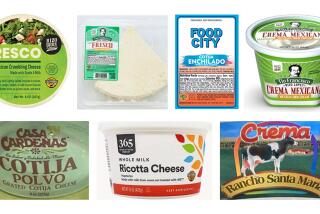U.S., Chile Seek Fruit Safety Plan : Goal Is to Prevent Tampering and Release Impounded Shipments
- Share via
WASHINGTON — Under intense pressure to resolve the Chilean fruit crisis, federal Food and Drug Administration officials and Chilean government representatives Wednesday labored to forge a system to prevent tampering with fruit exports from that nation and to allow release of tons of impounded produce stacking up in refrigerated warehouses in U.S. port cities.
“It’s important to bring a restoration to normal,” FDA Commissioner Frank E. Young said in an interview Wednesday. “That’s what we’re working on as fast as possible.”
At port inspection stations in Philadelphia, Los Angeles and Miami, teams of examiners sorted through thousands of crates of Chilean grapes, peaches, berries and melons but reported finding no additional evidence of poison beyond the two cyanide-tainted grapes discovered earlier in the week.
Threat Diminishing
Although testing is still under way, those findings suggest that the perceived threat to public health--which resulted in the removal of Chilean produce from stores nationwide this week--is diminishing. And federal officials said that they are hopeful of announcing a plan within the next few days for allowing Chilean fruit to go back on the U.S. market.
“We would like to have something ironed out soon but we can’t say when,” an FDA spokesman said Wednesday night after the meetings had ended. “There are an awful lot of technical points on this whole thing.”
Meanwhile, officials said that there is no evidence the two poisoned grapes found in a shipment of Chilean produce in Philadelphia last weekend were tampered with in the United States, shifting the focus of the probe on finding a culprit to the growers, shippers and dockworkers in Chile.
“The presumption is that it happened in Chile,” Young said.
An official of the FBI, which is conducting the investigation, agreed, saying that the leading theory is that the tampering took place in the South American nation. It was learned from other sources that FBI agents have been dispatched to Chile.
The urgency of resolving the deadlock is being pressed both by the fruit industry and the Chilean government. Soft “tree fruits” from Chile account for much of the produce in American groceries during the winter months and are crucial to the Latin American nation’s economy.
The major proposal discussed by the FDA and Chilean government officials was one urged by the American Produce Assn., sources said, the organization representing most of the U.S. companies that import Chilean fruits and vegetables.
“They want to establish something beyond what is being done now to guarantee that the chain is immune all the way from the tree to the grocer’s shelf,” said a spokesman for the importers organization.
To Send Team
With that in mind, other sources said that the United States is expected shortly to send a team of experts to Chile to help the Chileans beef up security measures to prevent tampering with produce during any stage of the journey from fields to shipment.
The security plan under discussion would involve a cooperative effort among the Chilean government, its growers and exporters, U.S. importers and the FDA, sources said. “We’re not just talking about inspection, but policing,” said the spokesman for the importers, who requested anonymity.
“They are also discussing ways in which the importers can take on some of the responsibilities of inspection, because the FDA is not equipped to do all of it,” he added. “The FDA is not going to release anything on the docks unless it is satisfied that it has been adequatedly inspected and tested--and that’s a lot.”
But FDA sources said that Young and the agency “are being very cautious about the proposals to assist us.”
Chilean Foreign Minister Hernan Felipe Errazuriz and Agriculture Minister Jaime de la Sotta were among those who met with U.S. officials Wednesday in an attempt to stem further serious damage to Chile’s $860-million annual fruit export industry.
“What they want, first and foremost, is some assurance that this problem is being dealt with as quickly, fairly and rationally as possible,” said one knowledgeable source. “They recognize very well our interest in protecting the safety of the American consumer. That is not an issue with the Chileans. But this industry represents millions of dollars and thousands of jobs to the Chilean economy.”
An FDA spokesman described the meetings as “an attempt to present a plan for saving the fruit that’s on the docks now.” Further, he said, “a good part of the plan is the tightening of inspection--that’s the direction in which people are going.”
The crisis began Monday after the FDA announced that it had discovered minute traces of cyanide in two red seedless grapes shipped from Chile via the ship, Almeria Star, into the port of Philadelphia. The discoveries were made after the U.S. Embassy in Santiago received two telephone threats suggesting poisoning of exported fruit.
The agency, in one of its most sweeping actions ever, impounded all fruit coming into the United States from Chile and urged all stores nationwide to remove fruit of Chilean origin from its shelves.
Further, Young warned Americans to dispose of all fruit in their refrigerators, except citrus and bananas, unless they were certain that the items were not Chilean in origin. Several other countries, including Canada and Japan, announced similar actions.
Defends Agency Action
On Wednesday Young again defended the agency action, insisting that it was not an over-reaction.
“In this case, it’s not just two little lousy grapes,” he said. “It’s two tainted grapes in one bunch from 2,400 bunches--and that’s a significant incidence. The government felt it was only fair to warn the American people.”
While most officials in the fruit industry said that they support the FDA recall, many were also calling Wednesday for a speedy solution to the impoundment.
“What we want from FDA is that they move as quickly as they possibly can,” said John McClung, a spokesman for the United Fresh Fruit and Vegetable Assn., which represents all components of the produce industry from the grower to the retailer. “There is a hell of a lot of product out there in cold storage that we need to know what to do with,” he said.
Young said the agency recognizes that it must produce an answer soon. “We have a field force of 1,000 people and 150 of them are working on the Chile problem,” he said. “This means that inspection of other foods, blood banks, pharmaceutical products and complaints on other issues are having to be put off.”
Lawmakers on Capitol Hill reacted cautiously to the growing controversy, saying that they prefer to wait and see what is worked out. Rep. John D. Dingell (D-Mich.), chairman of the House Energy and Commerce Committee, which monitors food safety issues, said through a spokesman: “It’s a little early because the FDA is trying to deal with it.” But he added that the panel would continue to track the issue.
The FDA said that visual inspections have been completed on all fruit from the Almeria Star in Philadelphia and that laboratory tests are being conducted on samples that appeared to have been punctured or damaged.
“As of now, no contamination has been found, but this does not mean, however, that the fruit will be released for sale at this time,” the FDA said in a statement.
The Almeria Star, an 11,000-ton dead-weight refrigerated freighter set sail from Valparaiso, Chile, to Philadelphia on Feb. 26 or 27 carrying a cargo of apples, nectarines, peaches and, of course, several thousand crates of grapes. It arrived at Philadelphia’s Tioga Terminal on March 11 and, after unloading its cargo, set sail again the same day for a return voyage to Chile. Cyanide in two of the grapes it carried was confirmed the next day, Sunday, March 12, by FDA labs in Philadelphia and Cincinnati.
The ship, built in 1976 and known until a few months ago as the Perth, flies the flag of Singapore and is owned by a Singapore-based company called Austasia Maritime Pte. Ltd. The ship is managed, however, by a large Cypriot company, Concordia Maritime Co. Ltd. According to Lloyd’s of London records, it sails regularly carrying fresh fruit from South America’s Pacific ports through the Panama Canal to the Gulf and Atlantic ports of the United States.
Staff writers Cathleen Decker, Ronald J. Ostrow, David Lauter, Don Shannon and Art Pine contributed to this story.
Related stories in Business.
More to Read
Sign up for Essential California
The most important California stories and recommendations in your inbox every morning.
You may occasionally receive promotional content from the Los Angeles Times.













